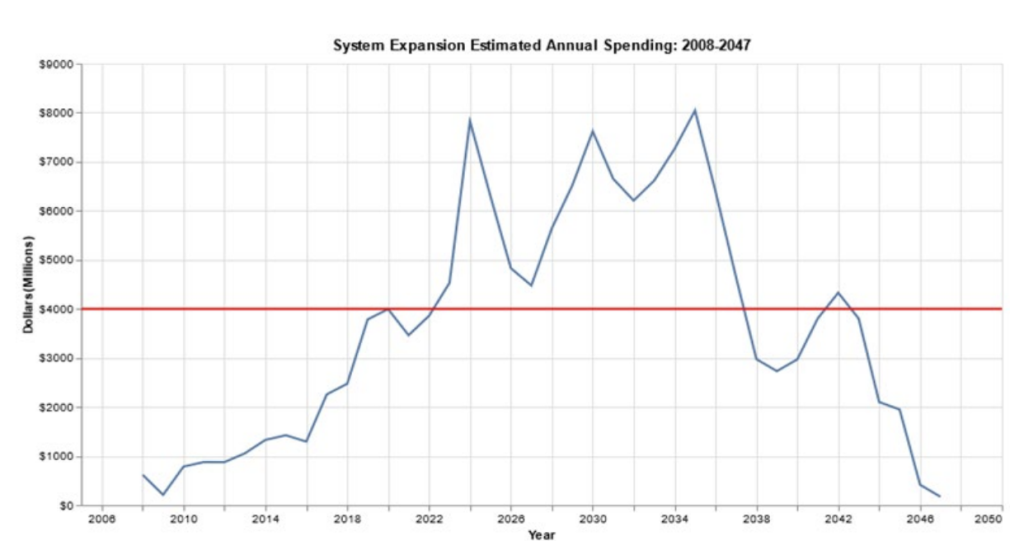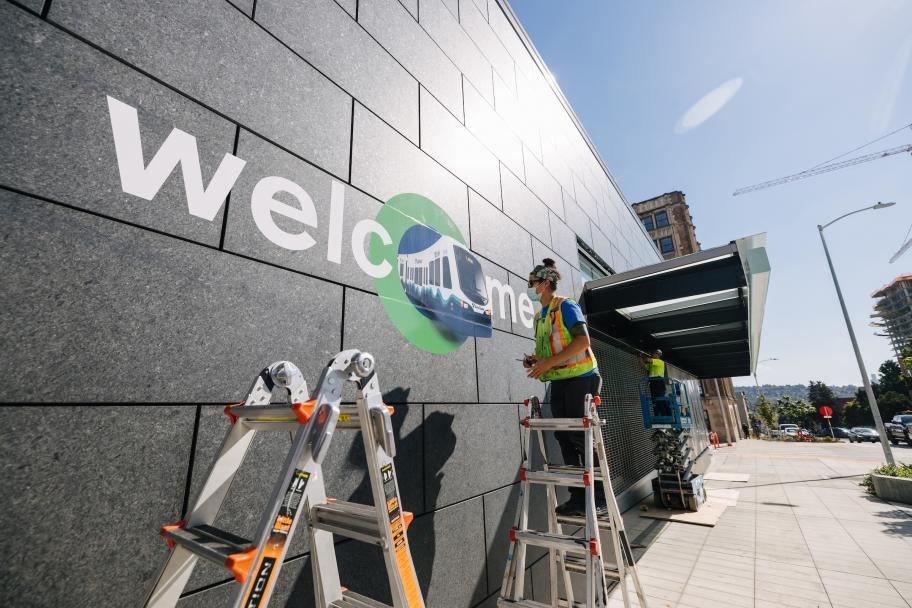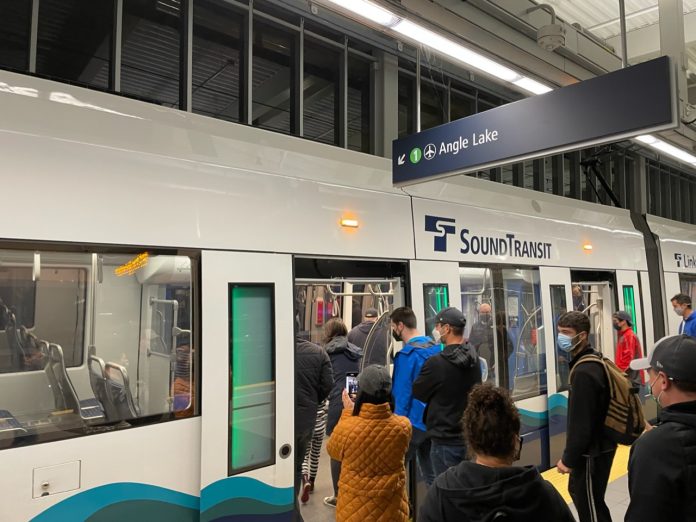Sound Transit’s ad-hoc Technical Advisory Group (TAG) has delivered sobering and wide-ranging recommendations on how to improve agency processes and reduce capital costs. The agency needs to arrive at better decisions earlier in the process or its expansion plans could be in serious jeopardy, according to six key recommendations in the TAG report and a briefing to the agency’s board earlier this month. Additional actions related to the recommendations will be coming over the next several months, according to King County Executive and Board Chair Dow Constantine.
Following a major capital program realignment in 2021, the eight-member TAG was commissioned to bring in outside expertise to find ways to speed up project delivery and reduce costs. Nine months ago, the TAG began their work by looking into the agency’s institutional processes and history. That involved extensive interviews with staff, contractors, and boardmembers as well as investigation of many project case studies.
Sound Transit’s capital program is growing rapidly and requires decisive management
The TAG had a leading message for the Sound Transit board: focus on the immense wave of capital expenditures coming to the system. These are poised to quickly rise as Sound Transit moves into new major construction projects in the next few years. TAG member Grace Crunican told the board, “By comparison, in 2024, the program that you have ahead of you is about five times bigger than what you did in 2016.” Next year, in fact, the capital program is set to top $8 billion and exceed $4 billion per year through the late 2030s. That’s a lot of spending requiring many board actions, all needing to be taken while the board is already busy with its current workload.

The workload comes from the board’s structure. The TAG outlined some examples to demonstrate the operational problems that the agency and board will face if arcane processes and procedures are not reformed.
Calendaring items for board review and approval, for instance, takes at least four weeks and involves 23 steps to accomplish. That requires a lot of staff time and detail, but it can be further confounded when a critical item cannot get before the board the following month, meaning delayed action for two or more months. Property acquisitions approval processes are also extremely burdensome. Under current procedures, staff can only bring 50 property acquisitions at a time before the board for approval. That may have been fine for past capital programs, but the agency is estimating a need to acquire somewhere between 500 and 700 properties just for the West Seattle and Ballard Link Extensions. That ultimately would require at least a dozen separate monthly meetings under today’s process to accomplish, or a year of work. The TAG report suggested that this would not be prudent and could mean significantly higher costs and missed opportunities.
In brief, the six TAG recommendations urge action to:
- Rebuild trust and clarify roles among staff and boardmembers;
- Hire an executive team experienced in managing mega capital infrastructure programs;
- Push down decision-making to the lowest levels possible and promote decision-making;
- Improve procedures modeled on industry standards by eliminating unnecessary steps and delays;
- Reform the agency betterment policy and strongly enforce it; and
- Enhance the relationship with the Federal Transit Administration to improve project delivery.
The biggies: trust, defined roles, and a new capital management team
The TAG strongly pressed upon the first two recommendations. Crunican bluntly said, “They must happen or don’t waste your time on the other four.” These recommendations acknowledge that trust and defined roles in decision-making are lacking between staff and board, and that the agency needs to hire a highly qualified executive team to manage the capital program. Without these issues being addressed, the TAG believes that the agency will find itself incurring further delays and costs.
On the matter of trust and roles, the TAG had a lot to say.
“In recent years, there has been a breakdown of trust between board members and staff,” the report said. “Boardmembers have not been told of critical information about projects in a timely manner, and this lack of information has led some to feel they must engage more deeply in the technical and operational details in order to fulfill their duties. Staff members have noted real concern and hesitation about the consequences of bringing difficult news to the board, so they delay reporting challenges or bad news, thereby reinforcing the lack of trust.”
Crunican offered some tough advice to the board to fix the division of roles so that “the board stays in the board’s lane, and the staff stay in the staff’s lane, and for the board it’s primarily the role of policy and budget.” In TAG’s view, the board has been micromanaging agency projects far too much, contributing to a very slow pace of decision-making processes as a consequence. Delayed decisions then cost the agency significant money. “When the organization is functioning as it should, staff would brief the board periodically on project activities, without seeking board direction or approval on what should be staff-level decisions,” the report said.
To aid the board’s decision-making, where needed, the TAG believes that staff should be empowered to provide their technical expertise through corresponding recommendations — a practice that the agency generally does not use. Crunican was frank and unfavorable on the board’s modus operandi. “You pay these people a good salary, you get highly skilled people here and then you don’t ask them to deliver to the board a recommendation,” she said. “And perhaps it’s out of fear that’s what’s going to come to you is not what you want to hear…but that issue of what you do and what they do, and changing that, changing the way Sound Transit operates is something you need to work on.”
Crunican also emphasized the importance of boardmembers seeing their roles as deciding what is best for the whole transit system, not just their individual jurisdictional projects or interests. “The boardmembers, when they go to sit in the Sound Transit seat, need to represent Sound Transit,” she said. “The staff is sorely missing a group of people that are there to solve the region’s problems as opposed to representing the jurisdiction from which they came…What the program needs is a board that is worrying about the whole picture and getting to the end goal.”
The second recommendation, as outlined by the TAG, is more straightforward. The agency needs to hire an executive team capable of managing the expansive capital program portfolio — perhaps a transit daddy like Andy Byford.
“You’re going to have to hire a recruiter to do it and you’re going to have to pay them more probably than you pay the CEO,” Crunican said. “We’re telling you this now so that people aren’t shocked that that’s what’s ahead of you.”
In the TAG’s view, three executives with differing roles need to be brought in under the Sound Transit CEO. The top role would be an executive director of capital programs with two deputy directors below responsible for managing the Sound Transit 2 and 3 programs, respectively. All of these executives, ideally, would have real-world experience in managing mega, multi-billion-dollar capital transportation projects and hold relevant engineering qualifications. The TAG believes this group should lead to significant cultural and operational improvements since they would be “empowered and expected to give clear yes or no to changes during the planning stages and subsequently empower other staff to lead consultants effectively during the design stage.”

Empowering decision-making at lowest levels and eliminating unnecessary processes
The third key recommendation revolves around decision-making. “Sound Transit now has a culture that pushes upward involving more people and more time but without added benefit,” said Connie Crawford, a TAG member. The TAG believes that the opposite needs to be done with decision-making distributed to the lowest level possible. Crawford reiterated that delayed decision-making process just adds cost.
The TAG cited change orders as an example of limited and restrained decision-making. Staff can only approve change orders of $50,000 or less while industry counterparts typically have authority for up to $5 million. Change orders can often be several million dollars, so with such little latitude to approve changes at the staff level, it can take a substantial amount of time to gain approval under the Sound Transit process and bog down project advancement in the field. The TAG also reported that even with the limited authority that staff do have, they often punt to superiors to make a call. Requests are almost never rejected, but these delays in decision-making ultimately delay projects and increase costs. Thus, the TAG recommends overhauling decision-making procedures and providing staff with special training and coaching to promote decision-making.
The fourth TAG recommendation is centered on making Sound Transit a desirable agency for contractors to choose. TAG heard concerning feedback that many contractors are hesitant to work with the agency due to its culture that delays decisions and payments. Contractors routinely are expected to carry out necessary change order work while not being paid for it months at a time. Some contractors have resorted to increasing their bids by 15% to account for this, Crawford said. Two contractors also specifically told the TAG that they would not bid on future projects as a result of these issues.
This is an enormous risk to the future capital program. Fewer qualified bidders leave the agency with fewer expert choices and exposes it to potentially higher project costs and slower project delivery. In the decades ahead, the agency will be competing with many other public agencies in the region that have their own capital expansion and improvement projects planned. So rectifying this problem now is important if the agency hopes to have its pick of contractors, the TAG said, but it will require a top-to-bottom review of processes and implementation of procedure changes to remove unnecessary processes and improve its image with vendors.
Restraining gold-plated betterments and improving federal relationships
For the fifth and six recommendations, the TAG urged the board to address how the agency makes local enhancements and improve relations with the Federal Transit Administration.
Sound Transit often is required to make community enhancements — known as “betterments” — as part of its projects in order to obtain local permits. Some of these can be valuable, but they can also pose substantial expenditure problems for the agency, according to Jim Linthicum of the TAG.
“We’ve been told by local agencies that they view Sound Transit as a piggybank to pay for extras that they’d like to have done for their community,” Linthicum said. “These betterments cost money to both design and to build, and equally important they’re delaying projects. When permit negotiations delay the construction contractor, the worst case of all, Sound Transit ends up paying for those delay costs.”
The TAG urged the board to adopt a strong agency betterments policy and strictly enforce it. “Municipalities have wrongly asked Sound Transit to cover the costs of road widenings adjacent to a new right-of-way, pay exorbitant mitigation costs to get permits to shut down traffic lanes and roadways, or use more expensive materials than required by code,” the TAG report said. “Underlying the betterment policy, Sound Transit needs to develop standard station designs and set acceptable standards for sidewalk restorations, pipe replacements, backfill aggregate, and other common, predictable third-party issues that have arisen during ST2 projects.”
This issue is a little thorny given that sidewalks and related improvements abutting a station have their utility, but it is clear that road widenings directly undermine the agency’s transit projects and many other betterments have little or no relationship to Sound Transit projects. The TAG recommended that Sound Transit look to peer agencies for good betterments policies and processes, and that the agency should evaluate how it might assert its “essential public facility” authority under state law to expedite permitting processes and preserve agency rights. Some methods that peer agencies use may be best suited if changes to state law are made to enhance agency authority and rights over local governments.
Finally, the TAG urged much more robust engagement with the Federal Transit Administration (FTA). Many of the federal review processes are taking much too long — due in part to a brain drain incited by the Trump Administration — and causing downstream impacts on project development and advancement. The TAG believes that Sound Transit should “support efforts to gain additional resources for the FTA” and “work with the FTA to identify firm agreed-upon review times and establish an accountability protocol.” That could help unclog the pipeline and get projects moving ahead faster.
Ultimately, some of the TAG’s recommendations are opaque and behind-the-scenes, but they are meaningful and critical to address if the agency is going to be successful. Whether or not the agency’s board and staff will take them to heart remains to be seen. But a first test will be how the agency’s board faces imminent decisions on projects like the West Seattle and Ballard Link Extensions. Will they be focused on high-level policy and budget decisions, or will they continue micromanaging project decisions and outcomes?
Stephen is a professional urban planner in Puget Sound with a passion for sustainable, livable, and diverse cities. He is especially interested in how policies, regulations, and programs can promote positive outcomes for communities. With stints in great cities like Bellingham and Cork, Stephen currently lives in Seattle. He primarily covers land use and transportation issues and has been with The Urbanist since 2014.


